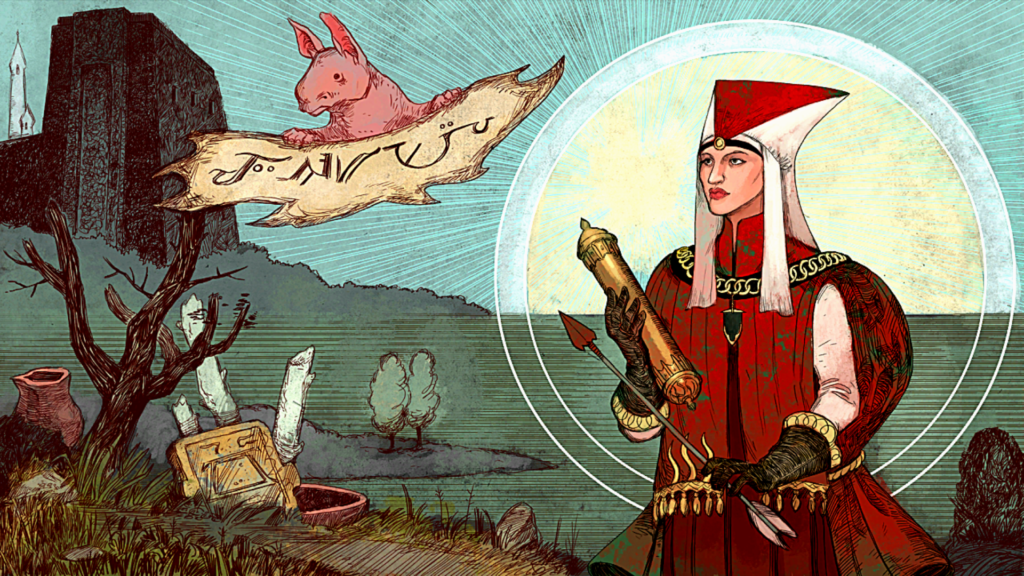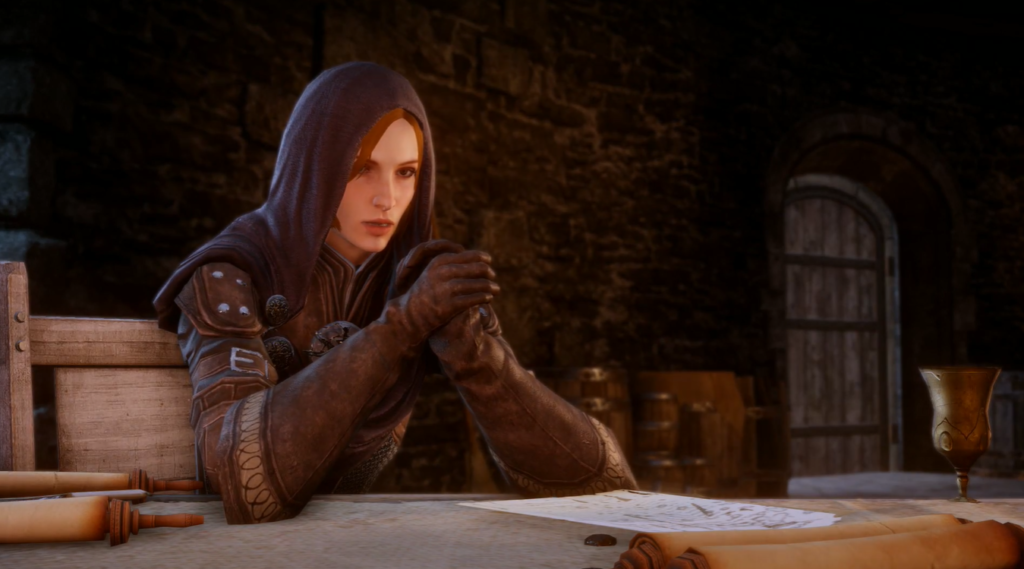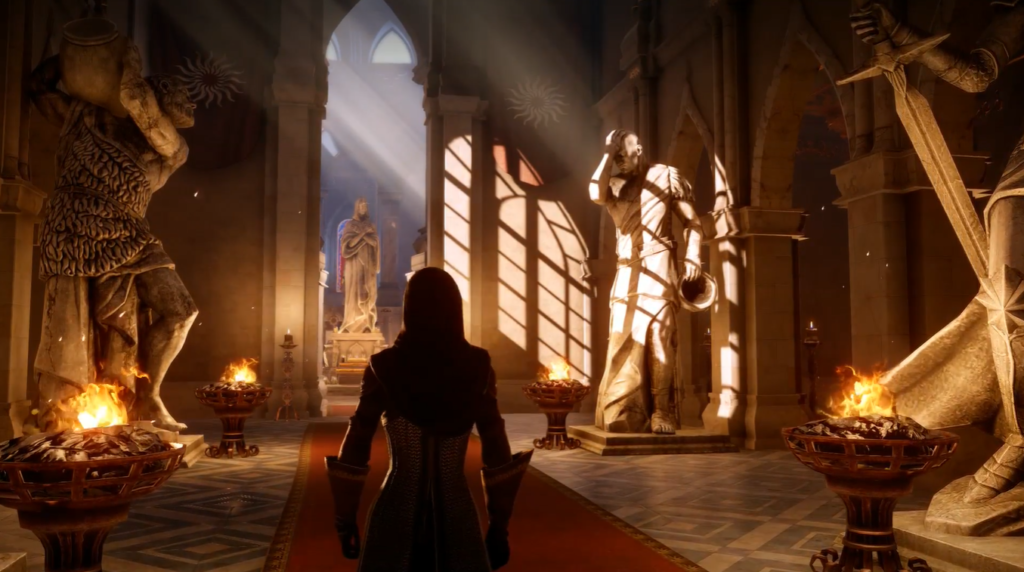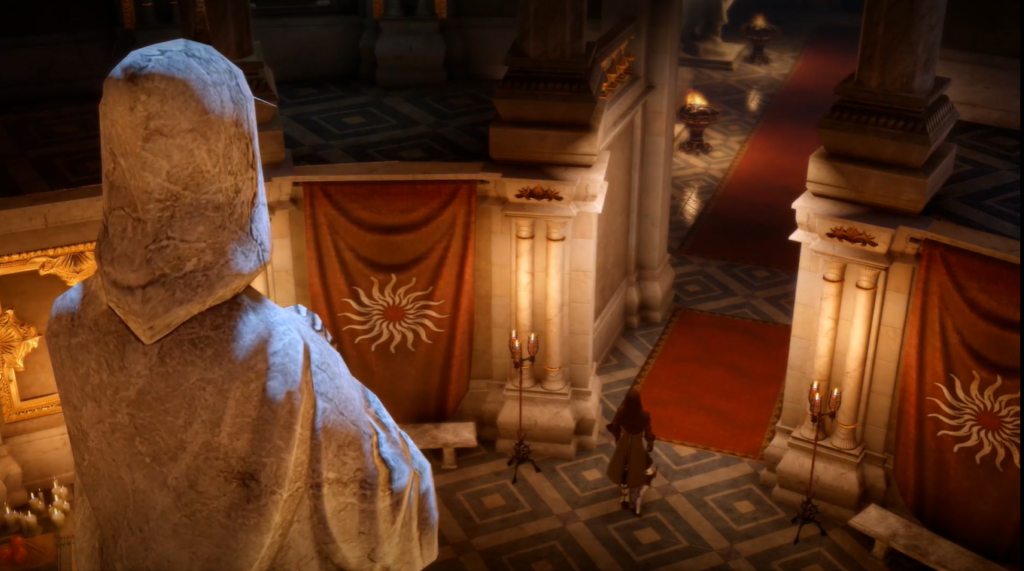
How the Dragon Age series queers faith through Leliana
The first time I played the Dragon Age series and met Leliana, a queer character whom faith, love and justice were more important than anything else, it was out of order. If we understand queerness not just as non-normative gender or sexual identity, but as a theory and practice of disturbing, resisting, and ‘queering’ normative structures, then this was already a queer way of experiencing the series.
I didn’t recognise her brief cameo in Dragon Age 2, so my first meaningful encounter with Leliana was in Inquisition. Here, she is an older woman, the Inquisition’s spymaster, and an advisor to the Inquisitor. She immediately comes across as professional, aloof, and mysterious; perfect for her role, certainly, but an enigma. You wouldn’t immediately peg her as someone so deeply devoted, but her companion quest powerfully focuses on issues of faith and doubt.
Having dedicated many years to her service, when Divine Justinia V dies, Leliana is no longer so secure in her idea of what service to her God, the Maker, looks like. She asks questions that are certainly familiar to me: How could the needless deaths of so many be the will of the Maker? What is His plan? And what is her place in that?
I certainly had an on-and-off relationship with faith for a while. As a child, my faith had been unquestioning, and I was so bound by my fear of God I could sometimes barely feel anything else. When I began to doubt Him, whether it was because everything around me told me that being queer and believing in God at the same time was impossible, or because it was difficult to understand how violence and suffering could be His will, I thought that must be the end of our relationship. It was too difficult, it didn’t make any sense.
For Leliana, it was so much clearer, so much simpler, when she could feel that she was serving the Maker, whose will is uncertain, by serving a person, whose will was so much simpler to follow. Leliana’s devotion to Justinia is so powerful that the game even offers the player the option to ask if she and Justinia were lovers. In this, we begin to brush against the ways in which Leliana queers normative assumptions and narratives about faith.
Having already played Inquisition, when I wound back the clock to play the first Dragon Age game, it felt like playing a prequel. The Leliana that the Warden encounters in Dragon Age: Origins is, at least in some ways, very different from the one we encounter in Inquisition. She is a young, energetic Chantry Sister, and though she is certainly just as passionate and somehow just as elusive, she is also far less jaded.
Through her companion quest, we discover that Leliana is being hunted by her former lover and employer, Marjolaine. The Leliana’s Song DLC recounts the betrayal and heartbreak that she experienced at Marjolaine’s hands in more detail, importantly showing us how it led her to the Chantry – specifically to Mother Dorothea, who would later become Divine Justinia V. Dorothea enlists Leliana’s help because she, too, was seduced and manipulated by Marjolaine.

On a personal level, religion has had painful and lasting effects on many of us as queer people. Guilt and shame certainly still colour the way I relate to myself, my body, and those around me in ways I sometimes think I’m only just beginning to comprehend. When it comes to the media, this is a story I’ve seen all too often, and it certainly isn’t without some truth, but it is only part of the story.
Another is that sometimes, in spite or even because of an admittedly tumultuous journey, we still have faith. Perhaps not in religion-as-institution, but in something greater, in that word you can’t quite hold in your hand but feel as it slips through your fingers.
Certainly for Leliana, questions of faith and doubt are inseparable from the queer, and shape her sense of self and her relations to others, but not always in a painful way. Traditional structures associated with faith are queered through the displacement of hetero-patriarchal relations by matriarchal, homosexual, and homosocial relations. The Chantry itself has a matriarchal structure, and Leliana’s personal devotion to Marjolaine, to Justinia, and to the Maker – who has no gender, by the way, no matter what pronouns we use – are all deeply connected. In all instances, it’s Leliana’s faith in them that is tested. When Marjolaine betrays her, she places her faith in the Maker, and in Justinia, instead. When Justinia dies, she has a crisis of faith. All three women are queer, and share tumultuous, circling relationalities of devotion, trust, and betrayal – sexual or otherwise.
Partly thanks to playing the Dragon Age series out of order, but partly thanks to this emotional and narrative thrust, I experienced Leliana not as a linear narrative, but as a queering of time and the very notion of linear ‘growth’. In both Origins and Inquisition, you can encourage her to be either merciful and compassionate, or unforgiving and violent in her pursuit of justice and service to the Maker. Her youthful idealism, which one would be tempted to frame as naivety, is instead framed as something of value, something worthwhile. In this sense, a Leliana that grows ‘up’ – that follows an expected, normative narrative of growing from a naive child into a jaded adult – is a violent one. Meanwhile, a Leliana that grows, as queer theorist Kathryn Bond Stockton would say, sideways and in circles, is a merciful and, importantly, questioning one. She finds her way ‘back’ to idealism, she grows in unexpected directions, and she practises what she preaches – liberation and compassion.
Faith is a difficult thing for a lot of queer people. Not only on an intimate level, but on a structural one too. From the role of the church in European colonialism, enforcing anti-homosexuality laws on cultures across the world, to organising, funding, and spreading conversion therapy practices…. The simple historical fact of it is that the institution of religion – particularly Christianity – has justified and promoted violence against queer people, especially queer people of colour, on an unthinkable scale for a very, very long time.

In the fictional world of Dragon Age, this same oppression is true of the Chantry.
The Chantry is structured around colonial violence and the systemic oppression of elves – a racialised group that mostly resemble Indigenous peoples – through the colonisation of elven land, the massacre of elves in holy wars called ‘Exalted Marches’, the ghettoisation of elven communities in cities, the suppression of the elven ‘Dalish’ religion and language, and more.
The Chantry also polices magic and oppresses mages in ways which are arguably queer-coded. Mages are born with magic; magic is often discussed in terms of being ‘unnatural’; blood and desire are important aspects of why people fear magic, invoked through blood magic and demons. If they are known to have magic, mages will be imprisoned in a Circle against their will, so many mages hide their identity, and if they refuse to comply with the Circle they will be ‘made tranquil’, no longer able to practice magic. Instead, they are stripped of emotion, desire, and agency in what is essentially a magical lobotomy.
In this context, Leliana resists the violence of the Chantry as an institution. She expresses faith as resistance, as a queer thing. In both Origins and Inquisition, you gain Leliana’s approval through helping those in need and demonstrating your commitment to ending systemic oppression. In Inquisition the calm, collected spymaster pretty much only loses her cool when her anger at injustice compels her. Whether as Sister or as Left Hand of the Divine, she consistently uses her position within the Chantry to question, disturb, and queer its space. In Origins she professes to feeling an outcast from the other sisters because of her radical beliefs, and in Inquisition, should the Inquisitor support Leliana’s bid for Divine, as Divine Victoria she becomes an even more ‘controversial’ figure, advocating for the freedom of elves and mages.
Ultimately, Leliana understands that the institution of the Chantry has wrought an enormous amount of violence across Thedas, but believes that the principles of faith should be understood as serving the liberation of the oppressed instead.

Leliana is so compelling to me not only because the very fact of being a queer person of faith is an underrepresented experience, but because it’s characterised by Dragon Age in a refreshingly sensitive, nuanced, and compassionate way. It doesn’t fall into tired tropes that represent faith as inherently queerphobic, it doesn’t depict Leliana rejected by a faith community or a religious family, and it even conveys her finding and navigating faith rather than losing it. These aspects of her are not in opposition, but irrevocably connected; it’s complicated, certainly, but faith offers genuine meaning and empowerment to Leliana. Certainly for me, when I finally met people who proved the notion that faith is inherently oppressive, painful, and queerphobic wrong, I began to find my way, not back to an old faith, but towards a new one. I began to see faith as love, as resistance, as a verb.
It can be easy to assume that faith means the absence of doubt, but in my view, to put your faith in anything is to concede the point that it can’t be known, so doubt is almost an inevitability of faith. In fact, I think the absence of doubt is a dangerous thing; those who commit violence in the name of religion are often those who would claim to know the will of God. Following from Jack Halberstam’s theory of failure as queer practice when ‘success’ reinforces violent capitalist systems, Leliana’s failure to ‘know’ the will of God, her failure to occupy a normative position within the Chantry, are in fact essential to her power.
Overall, Leliana’s queerness is more than identity; it’s the way she moves through structures of power. As a queer woman within the Chantry, she occupies and enacts a place of resistance, challenge, and discord. To doubt, to question, to fail, and in spite of all that to believe in a better way of being, to struggle and to resist in order to make that a reality. Now that’s a force to be reckoned with.





